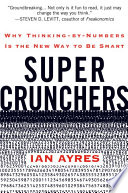

In 'Super Crunchers', the author, Ian Ayres, emphasizes the transformative power of data in decision-making processes across various fields. The book argues that data-driven approaches can often yield better results than relying on intuition or traditional methods. Ayres illustrates this concept through various case studies, demonstrating how organizations that leverage data can uncover patterns and insights that would be impossible to discern through conventional means. By analyzing large datasets, companies can optimize operations, enhance customer experiences, and predict trends with remarkable accuracy. This idea challenges the notion that expertise and experience are the sole determinants of successful decision-making, advocating instead for a more empirical approach that prioritizes data analysis.
Continue readingAyres discusses the inherent limitations of human intuition and the biases that often skew our judgment. He presents evidence showing that even experts can be misled by cognitive biases, leading to poor decisions. For instance, he examines how professionals in various fields, including medicine and finance, can fall prey to overconfidence or confirmation bias. By relying on data rather than gut feelings, organizations can mitigate these biases and improve their decision-making processes. This idea serves as a cautionary tale, urging readers to recognize the fallibility of human judgment and embrace data as a more reliable source of truth.
Continue readingThe book delves into the realm of predictive analytics, showcasing its applications in diverse sectors such as healthcare, marketing, and sports. Ayres explains how organizations use statistical models to forecast future outcomes based on historical data. For example, he shares how sports teams analyze player performance data to make informed decisions about recruitment and game strategies. In healthcare, predictive analytics can help identify patients at risk for certain conditions, allowing for proactive interventions. This idea highlights the potential of predictive analytics to revolutionize industries by enabling more informed and strategic decision-making.
Continue readingAyres explores the role of algorithms in processing vast amounts of data to derive actionable insights. He discusses how algorithms can automate complex analyses that would be impossible for humans to perform in a reasonable timeframe. The book illustrates various examples of how businesses use algorithms to optimize pricing strategies, enhance customer targeting, and streamline operations. This idea underscores the importance of algorithmic thinking in the modern data landscape, as organizations increasingly rely on technology to drive efficiency and innovation.
Continue readingAs the use of data and algorithms becomes more prevalent, Ayres raises important ethical considerations surrounding data privacy and the potential for misuse. He discusses the implications of data-driven decision-making, particularly in sensitive areas such as healthcare and criminal justice. The book encourages readers to consider the ethical ramifications of their data practices and advocates for transparency and accountability in data usage. This idea serves as a reminder that while data can enhance decision-making, it also carries responsibilities that must be addressed to avoid negative consequences.
Continue readingAyres envisions a future where data-driven decision-making becomes the norm across all sectors. He argues that as technology continues to evolve, the ability to analyze and interpret data will be increasingly critical for success. The book suggests that organizations that embrace this shift will gain a competitive edge, while those that resist may struggle to keep up. This idea emphasizes the necessity for individuals and organizations to adapt to the changing landscape of decision-making, urging them to cultivate data literacy and analytical skills.
Continue readingThroughout 'Super Crunchers', Ayres provides a plethora of case studies that illustrate the principles he advocates. These real-world applications serve to reinforce the book's key ideas and demonstrate the tangible benefits of data-driven decision-making. From predicting consumer behavior to optimizing supply chains, the examples highlight how various industries have successfully harnessed data to achieve remarkable outcomes. This idea emphasizes the practical implications of the book's concepts, showcasing that data is not just theoretical but can have profound impacts in everyday business operations.
Continue readingThe reading time for Super Crunchers depends on the reader's pace. However, this concise book summary covers the 7 key ideas from Super Crunchers, allowing you to quickly understand the main concepts, insights, and practical applications in around 21 min.
Super Crunchers is definitely worth reading. The book covers essential topics including The Power of Data, The Limitations of Human Intuition, Predictive Analytics, providing practical insights and actionable advice. Whether you read the full book or our concise summary, Super Crunchers delivers valuable knowledge that can help you improve your understanding and apply these concepts in your personal or professional life.
Super Crunchers was written by Ian Ayres.
If you enjoyed Super Crunchers by Ian Ayres and want to explore similar topics or deepen your understanding, we highly recommend these related book summaries:
These books cover related themes, complementary concepts, and will help you build upon the knowledge gained from Super Crunchers. Each of these summaries provides concise insights that can further enhance your understanding and practical application of the ideas presented in Super Crunchers.